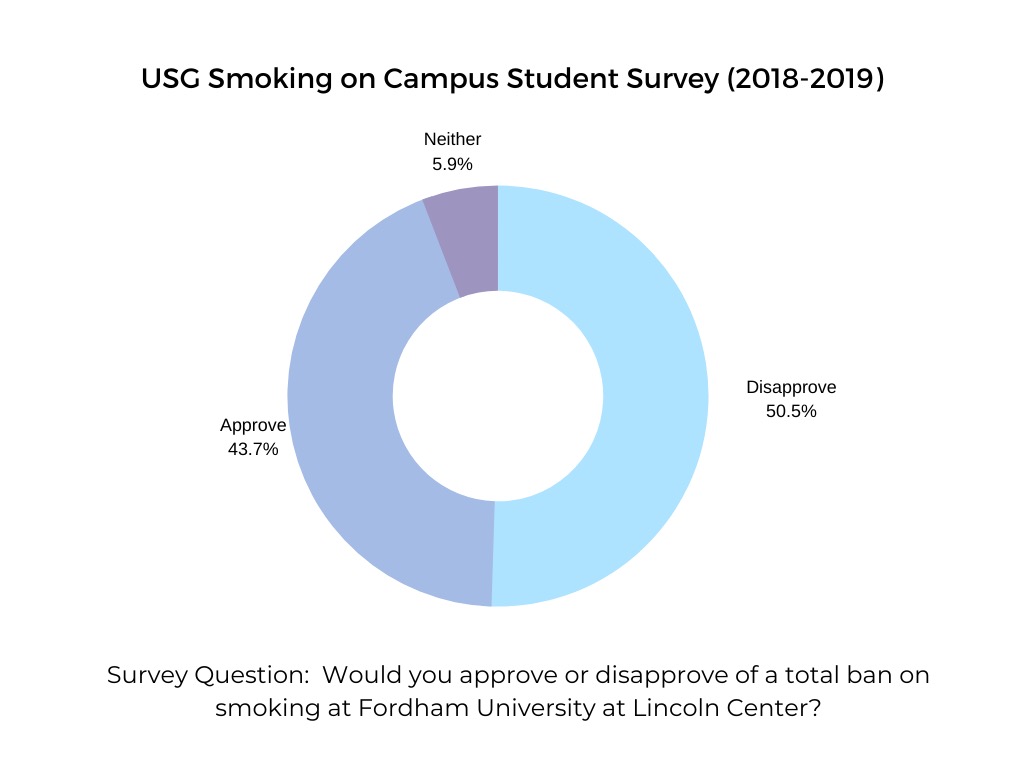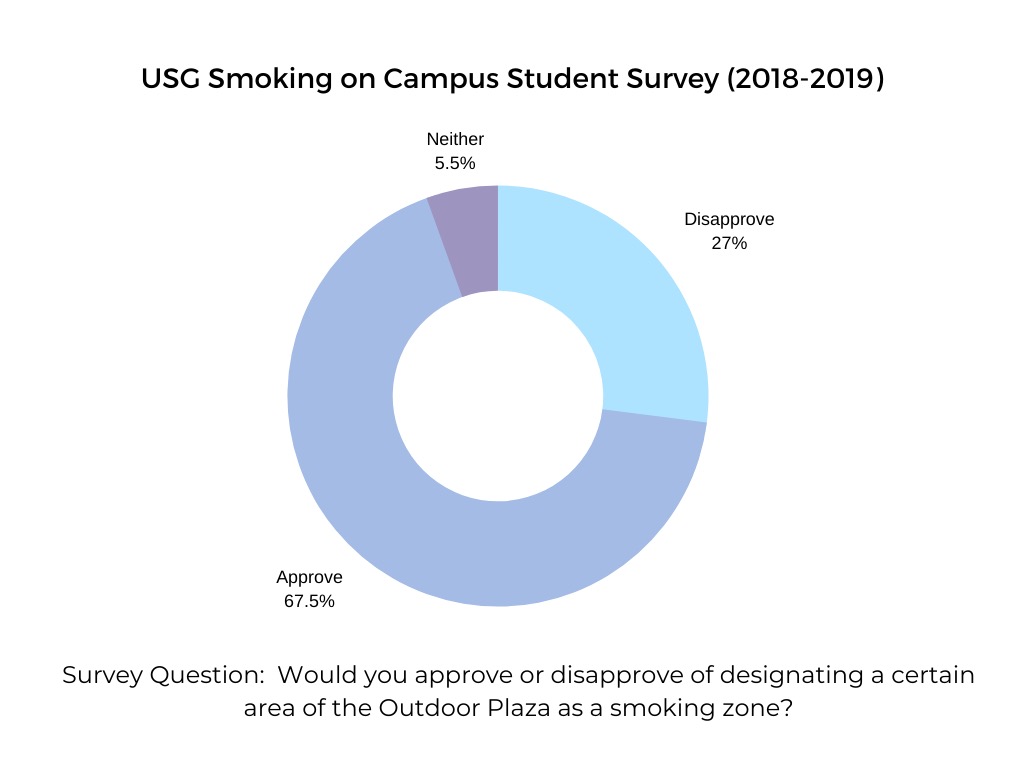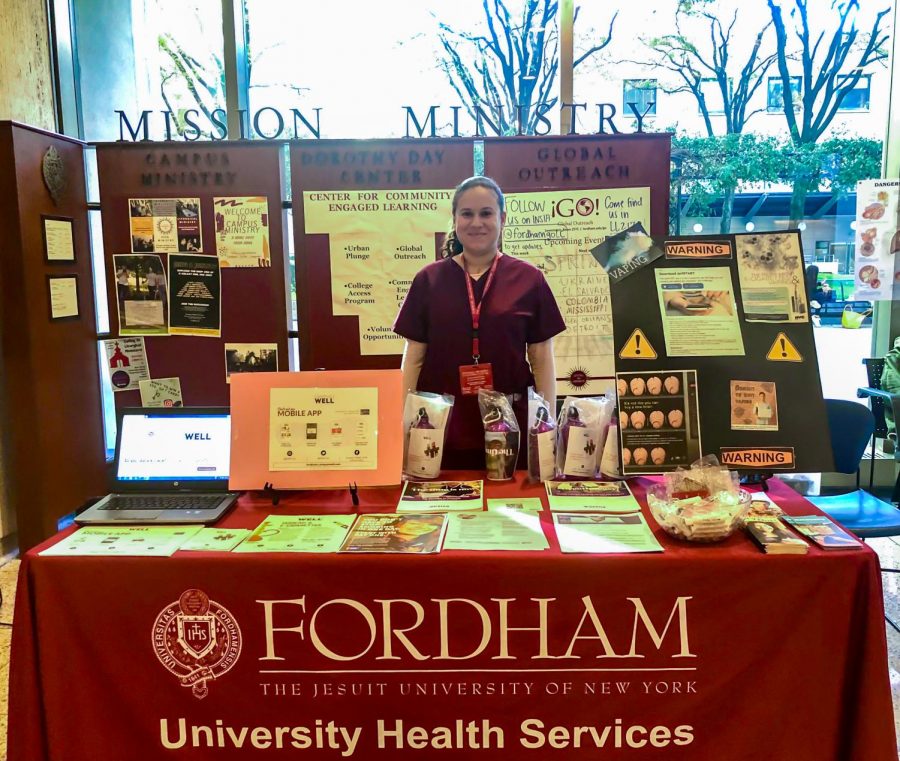Annual Great Fordham Smokeout Spotlights Vaping
MICHELLE AGARON/THE OBSERVER
Advocates for clean air host the Great Smokeout each year by occupying a table in the Lowenstein lobby.
December 4, 2019
Since its inception, the primary goal of the Great Fordham Smokeout has been to educate students about the dangers of smoking and decrease smoking on campus. Due to an increase in reporting and nationwide news about the topic, the focus of the 2019 campaign, which occurred on Thursday, Nov. 21, in Lowenstein Plaza, has shifted to vape products and e-cigarettes. The set-up this year included a table strewn with flyers about the dangers of vaping and smoking, “quit kits” filled with candy and information to help smokers who are thinking of quitting, quizzes to measure nicotine dependence and a plethora of recent research that depicts the harms of vaping.
As of Nov. 20, a total of 2,290 vape-related injuries and 47 deaths have been reported to the Center for Disease Control and Prevention (CDC). While a definitive cause for the growing number of cases has yet to be found, health officials have identified a form of Vitamin E as the most likely culprit, which was discovered in samples of lung fluid from hospitalized patients.
Several states, including Colorado, Michigan, and Washington, have since banned the ingredient in vape and e-cigarette products sold to the public. New York has joined the effort by attempting to ban flavored vapes throughout the state, but the motion has been halted and, more recently, opposed by President Trump. The indecision around the ban, however indirectly, allows for the persistence of vaping at Fordham and other college campuses like it.
David Vassar, a reference and instruction librarian at Fordham and an organizer of the Smokeout, is an advocate for a city-wide change in policies regarding smoking and vaping. He believes that efforts to reduce or end smoking within certain environments in the city can incentivize institutions like Fordham to follow suit.
“Since we’re such a small campus, I’ve always thought Lincoln Center could be the flagship of the university system in going smoke-free. It only takes a few lit cigarettes to ruin the air for a lot of people because we’ve got such a small green space,” he said. “It’s really unfair to our security staff to have to tolerate secondhand smoke in such close quarters as a condition of their employment.”
Tina Thermadam, president of the Lincoln Center United Student Government (USG), met with Vassar earlier that week and said that while she is in full support of spreading awareness and promoting education about the risks of smoking, she cannot speak to a complete ban on smoking due to the results of a student opinion survey USG released last academic year.
Of the 412 students surveyed, 51% were against implementing a total ban on smoking at Fordham College at Lincoln Center (FCLC), 44% were in favor, and 6% voted for neither. As for designating certain areas of the Outdoor Plaza as smoking zones, 68% would approve, 27% would disapprove, and around 6% were not inclined either way. These results stand in contrast to a survey conducted by the organizers of the Smokeout in 2017, in which 80% of the 220 students surveyed “somewhat or strongly agreed that a smoke-free Fordham would be desirable.”

Alina Gubanova, FCLC ’22, is hesitant to support a smoke-free campus. The ban wouldn’t directly affect her since she usually smokes off-campus, but she views it as a question of fairness when considering Fordham’s other campuses.
“I don’t think that making the campus completely smoke-free will be a smart move. While it might not affect students and staff at Lincoln Center by much, it might cause some annoyance for people at Rose Hill, since their campus is much larger. I think it would be better to have some designated smoking areas around campus — banning people from smoking right in front of the entrances is a good first step,” she said, referencing the 50-foot rule implemented in the spring of 2016.

Seeing as students and staff at FCLC continue to regularly smoke on campus, the possibility of a completely smoke-free campus occurring in the near future appears slim. Regardless, the organizers of the Smokeout plan to continue hosting the event yearly and provide resources for students through readily available guides such as Coping with College, which can be found through the Fordham library website.













